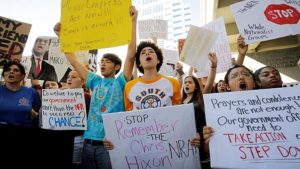I am hearing some talk in recent days about the nature of the student-led protests that are developing across the nation in reaction to the spasm of gun violence in our public schools.
It has something to do with an earlier era of protest that got enough people’s attention to hasten the end of a costly and divisive war.
Many observers equate the post-Parkland, Fla., school massacre response to what transpired in the 1960s and early 1970s, when thousands of Americans protested the Vietnam War.
They hope this protest has the staying power of that earlier time, when Grandma and Grandpa were much younger and took on the power structure that continued sending young Americans to die on battlefields halfway around the world.
Young Americans are dying today, too. The difference is that they are dying in classrooms here at home.
I wasn’t among the young folks who marched in the street, carrying a sign, chanting slogans … that kind of thing. I wasn’t wired that way. Indeed, I took part for a time in that war, heading off to Vietnam in the spring of 1969 to serve in the Army.
Upon my return and later my separation from the Army in the summer of 1970, I was filled with plenty of doubt about that war and whether its mission was worth continuing. The Vietnam War did awaken my political awareness, although I put it to use in ways that didn’t require me to stand on street corners yelling my displeasure at U.S. foreign policy.
The Parkland slaughter does seem to have awakened a new generation as well. Students plan to “March For Our Lives” on March 24. In Amarillo — a community not really known as a political hotbed for protest — that event will begin at Ellwood Park, where students and their elders will gather to march to the Potter County Courthouse.
Should this protest shred the Second Amendment to the U.S. Constitution, which guarantees the right of Americans to “keep and bear arms”? No. Not in the least. Surely there must be some legislative remedy that preserves the amendment, but which makes it more difficult for nut cases to obtain firearms.
The young people who are on the “front lines” of this struggle are seeking to have their voices heard. Decades ago, another generation of young people were thrust onto the front lines to fight another war. Their voices were heard eventually. They brought change then. Their descendants can bring it once more.
